#divorce it from all religious context.
Explore tagged Tumblr posts
Text
discussion of a religious song so dont read this if you dont want that but im not focusing really on the religious part anyway.
ask folks what they like about their favourite music.
just wanted to share cause its my mother's favourite christmas song;
my mother loves Little Drummer Boy above all christmas music. to me its always been a sort of 'its sweet and slow and i like it, one of the more tolerable religious songs' but nothing more, so i asked her why its her favourite. and her answer was along the lines of
'well, its just sweet is all. heres this little kid, hes got nothing, but he heard there was a king born and so he goes to see the baby, and he says 'im a poor boy too', and he doesnt have anything to give him, but he has this one thing he can do for him. he can play the drum for him. its small and its not much, but its what he can give, and so he does. and it works, cause the baby smiles. makes me teary every time'
and lemme tell ya. i got 0 of her crying-genes and i am now unable to maintain composure listening to that damn song. 'i played my best for him, then he smiled at me' i am weeping
#the image of this little boy thats got nothing#divorce it from all religious context.#just this little boy hearing that a king has been born in a barn#and theres other kings giving him grand expensive gifts fit for a king#and he doesnt have anything. he cant give any gift let alone one fit for a king#but he can play for him. and he does.#my blooming into an agnostic has left me with lots of reflection on why i liked certain songs at my mandatory school mass#and the BIGGEST thing was. its a person. tell it like a person#and little drummer boy does that perfectly#i am misty-eyed imagining a newborn looking at this little boy. swaddled up. and he plays a little drum and the baby smiles.#its humanity. and i never sat and thought abt it for this song til my mother said that#so ask ppl why certain songs are their favourites#anyway im gonna go re-up on silent night in sign language#cause i used to know the whole thing#.yappin
5 notes
·
View notes
Note
I think we should talk about Wu Zetian, China’s only female emperor, who historically has been regarded as a horrible and brutal leader.
She was born a commoner, became a concubine to one emperor, married his son and then took the role of emperor for herself when he died. She was politically adept, highly ambitious and extraordinarily intelligent.
History has accused her of smothering her newly born daughter and blaming a rival for her death. She had that rivals hands and feet cut off and then had her thrown into a vat of wine in which she was left to drown. She gouged out another rivals eyes and had acid poured down her throat. She wiped out 12 entire branches of a clan. She poisoned her mother. Just how accurate these things are is up for debate, but while these things might not all be true, she certainly did have several family members killed. And she did deal with her rivals and her detractors ruthlessly. Yet none of these things would have attracted criticism if she had been a man. She was no more scandalous than any other ruler during that time period.
But! Her rule was peaceful and prosperous. She avoided wars and welcomed ambassadors from as far away as the Byzantine empire. She changed laws so common people could be chosen for roles in government for their abilities rather than their name or status. She acknowledged and acted on criticisms from her retainers. She built watchtowers along the Silk Road so merchants wouldn’t be harrowed by bandits. Her reign saw women given more freedom(the ability to divorce, hold government positions, travel, hunt and ride horses, to be recognized by scholars).
She supported Buddhism and helped the religion spread and grow through commissioning temples, monasteries, and even a statue of the Buddha said to be carved in her own likeness. In the eyes of the common people, she likely would have been an incredibly popular ruler.
She remains a controversial figure primarily because of stories about her personal actions against her rivals by male Confucian officials who were prejudiced against strong and ambitious women and while they undoubtedly exaggerated aspects of Wu’s life, there is still substantial verifiable evidence of her ruthlessness.
We should also be aware that although she allegedly held her power through murder and merciless, according to Confucian philosophy, ‘while an emperor should not be condemned for acts that would be crimes in a subject, he should be judged harshly for allowing the state to fall into anarchy’ and viewed under this lens, Wu did effectively fulfill her duties as a ruler.
So we have a leader of ancient china who had two faces, one who committed acts of vile cruelty against her family and rivals and one who gave her citizens peace and prosperity.
Through a modern lens she can be viewed as an evil woman who rose from humble beginnings and coldly and calculatingly murdered her way into arguably the most powerful position in the world. A rich woman who threw crumbs to her peasant people while she lived luxuriously. She is a deadly woman, a black widow, an evil stepmother, a kinslayer. But according to historians, “without Wu there would have been no long enduring Tang dynasty and perhaps no lasting unity of China.”
The comparison to a modern mr beast obviously doesn’t hold water, but we can certainly analyze jgy to a more comparable historical figure and argue more accurately in a historical context if jgy was a good leader as the de facto emperor as the cultivation worlds Xiāndū.
It’s easy to see the comparisons between Wu and jgy, both were undesirable and deemed unfit by society. But both were politically adept, highly ambitious and extraordinarily intelligent. Both had family members murdered, perhaps sharing between them filicide. Both had a clans murdered to a man. Both are thought to have had their faces carved on religious relics for their narcissistic pleasure. Both had watchtowers built as a defense for their people. And both were torn down by the men following after them, vilified and distorted. Both forever destined to be speculated upon and misunderstood. Both of their legacy’s destroyed by rumor and falsification. It would not surprise me in the slightest if mxtx didn’t draw on Wu at least a little bit in the creation of jgy. Both Wu and jgy are culpable for some pretty heinous stuff, that can’t be denied. But like Wu, jgy also has a second face.
Moral bias and character motivation aside, his efforts to build watchtowers, his patronage of religion in the building of Guanyin temple, his fight against political corruption, his years long peaceful reign, his charity, all these things lead to the conclusion that under the rule of Confucian, he more than aptly fulfilled his role as a leader for his citizens.
And if you really want to look at Jgys leadership through a modern lens, we really don’t have to look much further than Ingersoll. “If you want to find out what a man is to the bottom, give him power.”
And really that’s part of the tragedy of his character. Because of his background he excelled when he was in a role of leadership. He was good at it.
Whether or not jgy as a literary character is a good person, is subjective and should not be used to measure his role as an effective leader.
All of that being said, jgy is my bestfriend and I love him and would I die for him.
.
238 notes
·
View notes
Text
Vedic Astrology Observations
1. Punarvasus tend to be very spiritual if not religious. They find peace in prayer. Another thing I've noticed is that they are very sexually conservative (probably because of their cat yoni). Mariah Carey, Punarvasu Moon was a virgin when she married her first husband and waited until marriage to be intimate with her second husband as well. She was engaged to James Packer for 18 months and they reportedly never had a physical relationship.
Miranda Kerr, Punarvasu Moon was in a relationship with Evan Spiegel for 3 years and waited until marriage. Drew Barrymore, Punarvasu Moon has said that she's been celibate since her divorce in 2016.
2. Mariah Carey, Punarvasu Moon speaking of the nature of light & time , her memoir has multiple chapters titled with light-related names and even sooo many of her songs , including Butterfly (Punarvasus are connected to butterflies)
3. Moksha gana nakshatras embody the trickster archetype. They also often argue or provoke people simply for the heck of it. 2/3 Moon ruled naks (Rohini & Hasta) are Moksha gana and it makes sense as to why they fuck with people just because they can, they have nothing to gain from it and it serves no purpose, they're evil for the heck of it. They'll go to any length to ruin you even if they ruin themselves in the process.
Moksha means liberation in Sanskrit (Sanskrit is a classical language like Latin that is pretty much only used in a scholarly context) and is one of 4 purusharthas or motivations assigned to the 27 naks. The others are artha (wealth) kama (pleasure) and dharma (duty). Moksha would be located at the very top of Maslow's hierarchy of needs, which means an individual with Moksha gana naks has transcended all the other base level motivations of accumulating wealth, seeking pleasure and doing one's duty. What is left to do now? If an individual is evolved, they actually seek liberation through their spirituality but if they are not, not only are they unbothered by any ordinary human motives, they lack the ability to devote themselves to anything ordinary because they simply dont care about getting a job or building a house or whatever. this means they also kind of exist beyond normal social norms?? go up against a Moksha gana native/Moon dominant person and the kind of arguments they'll use against you will reveal this nature of theirs. like they will have zero issue using your every vulnerability and insecurity against you just to win an argument or put you down. they hate to look "weak" so they will tear you apart just because they can, with no regard for any history you share. there are people who defend this by saying "oh well i was mad" babygirl everybody gets mad, but if someone isnt raising their voice, being petty or singling you out and bringing up your past to make you crumble, its not because they're incapable of it, its because they have principles.
Moksha gana naks love to play devil's advocate.
4. Rahuvians have bad memory, they probably repeat the same stories in different ways every few weeks lol
5. Saturnian women often marry billionaires according to Claire Nakti and I recently found some more examples of that:
** Mariah Carey, UBP Sun was engaged to Australian billionaire, James Packer who used to date Miranda Kerr, Pushya Rising (both these women are also Punarvasu Moon), Miranda is now married to the CEO of Snapchat.
** Lisa Manobal, UBP Sun is dating Frederic Arnault, a French billionaire
** Elle Macpherson, UBP Sun was in a relationship with Arpad Busson with whom she had 2 kids (he's not a billionaire but he does have a net worth of $500 million)
6. Nominative determinism, literally "name-driven outcome", is the hypothesis that people tend to gravitate towards areas of work that reflect their names.
but i thought i'd use it in the context of astrology and how most people are subconsciously given names that reflect their nakshatras
ex: Angelina Jolie
the name Angelina is an expansion of Angela which is derived from the Greek word Angelos which means "Angel" or "messenger". Angelina has Revati Moon which is a deva ("godly" nakshatra) and Jolie is the French word for "pretty" and Angelina has Venus in 1h and is Pushya Rising (these were two of the biggest beauty indicators according to Claire's research)
(its so cute to me that her name is literally Angel Pretty bc damn right she is)
Yara Shahidi (Revati Moon)- Yara is the name of a water spirit and in Portuguese it means "Water lady" (Yara has stated that her name means one who is close to your heart, but names can have several different meanings) and Shahidi means "witness" in Persian. I feel like all of that really ties together with Revati being in pisces rashi and the last nakshatra that is "witness" to everything else etc
#astrology notes#sidereal astrology#astrology observations#vedic astro notes#nakshatras#astro notes#astrology#vedic astrology#astroblr#astro observations#astro community#12h#jyotish#pisces#punarvasu
338 notes
·
View notes
Text
My issue with the Hellaverse rulers
We all know the story of Lucifer causing a war in Heaven due to his hatred of mankind, losing and taking a quarter of the angels with him. Those Fallen Angels became the rulers of Hell, essentially torturing the sinners and going to Earth to tempt us or just chill out and give us math lessons (I’m not joking, some do when summoned.) Not in Viv’s Hell though, they were no war so where do the other demons come from? How did these demons manage to harvest such great powers, powers that can give them access to Earth and outrank the lower class? You can theorize that the Seven Deadly Sins were born from the sin of humans or some shit but that’s headcannon territory and this does not explain what created the Goetia. Are we supposed to believe that the second Lucifer and Lilith fell everyone was there to greet them with flowers and a little flag saying “Congratulations! You fucked up but you get a new kingdom!”
Talking about the Goetia…
How exactly do they work here? The Arc Goetia is listed in a book known as the Lesser Keys of Solomon. Their section contains detailed information about 72 demons and how to summon them, these demons were Fallen Angels. A random King named Solomon who appeared to be a master of witchcraft received a ring from an angel that gave him authority over demons and he used them to build temples.
And then you have the Helluva Boss version, with a Stolas born in Hell, who is at least 35. Why do they even exist in this world? The whole thing with the Goetia is that they were demons at the service of King Solomon around 970 to 931 BCE.
You also have those characters who are classified as such but those do not appear in the book like Stella who’s Andrealphus’s sister and who are their parents you ask? Figure it out. But fair enough maybe they do something that is specific to them like I don’t know:
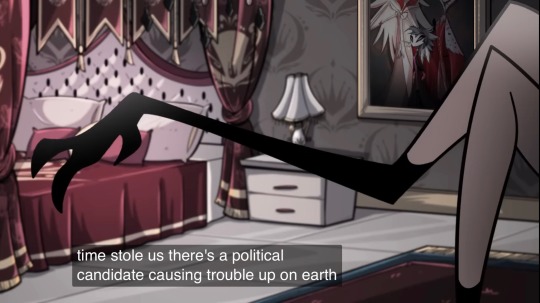
[Context: Stolas wanted Blizø to kill said a candidate who was causing trouble for his associate.]
Ah! So the Goetia mission is essentially to make life worse on Earth using lower species like imps to do their binding. I would have hoped but… it’s a screenshot from the pilots which isn’t canon anymore. And til now, we have no indication that this is what the Goetia does in the cannon.
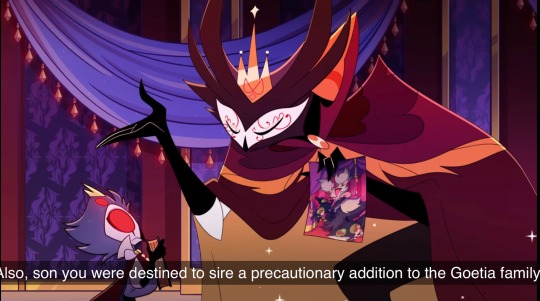
Stolas is immortal why does he need to have a child? Maybe it’s for other Goetia duties that will never be addressed in the shows but he’s the only character who is visibly shown to be forced into a marriage. Paimon clearly doesn't care if you are gay, asexual, or whatever if he wants you to make a baby you will make a baby. So naturally Andrealphus will have a wife, right? He’s only a duke and his sister got married to a Prince seemingly to alleviate their family so shouldn’t he marry a Princess or something like that, his parents would certainly pressure him to do so. And since Stolas needs an heir despite being immortal, wouldn’t he need one too?
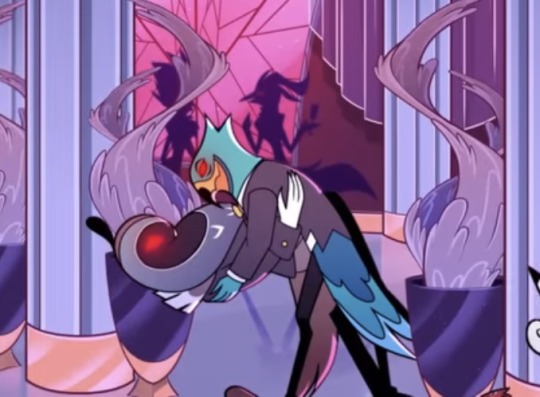
[Context: God the inconsistency's gonna kill me. This is Stella’s party in ep1 of season 2 and you can see two men dancing together.]
Stolas could have been openly gay since the beginning, so what prevented him from divorcing Stella the second Octavia was born? The girl would have been too young to remember her mother and if she asked questions he could have just explained to her that Stella wasn’t a good person.
“But he played along so she could have a normal childhood.”
That would have been a great excuse if Stella did the same thing.
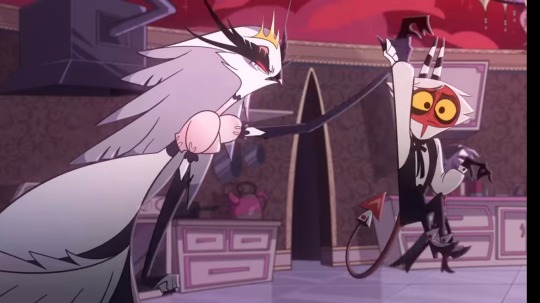
This woman literally threw their butler at her husband the second she learned he cheated on her with an imps not caring that her daughter was there! Stella is quick to anger and will most likely choose physical violence when she’s upset. How did Stolas though that THIS was a normal childhood for Via?!! And it’s not like he was trapped in the marriage they divorced quite easily… wait a minute…
Does Viv even understand the concept of arranged marriages?! Usually, both families benefit from the union (financially, religiously, and other), but few result in divorce due to the massive social pressure caused by the two families and the constant control and influence the parents have on their children. Realistically speaking, Paimon would have threatened Stolas for trying to leave Stella because there’s no way he married his immortal son just to get a new kid in the family.
Yet, it still happened without any complication and Stella left his castle. So where’s Octavia?! She’s his heir! He’s supposed to learn her fairy dust and star magic or some shit, he should automatically get full custody of the child! We don't even know what the girl's relationship with her mother is but considering Stella is framed as a psychopath, I wouldn't want my kid to stay with her EVEN for vacation, Octavia is 17 she saw her mother throwing a tantrum once I think she’ll understand why her father doesn't want her near Stella.
#hazbin hotel critique#hazbin hotel criticism#hazbin hotel critical#vivziepop criticism#anti vivziepop#vivziepop critical#vivziepop critique#helluva boss critical#helluva boss criticism#helluva boss critique
113 notes
·
View notes
Note
Hi! I was wondering if you had any opinions on the play Red by John Logan? Really admire the Rothko work you do!
First of all, thank you.
Secondly, I think I maybe in a weird position to critique this. I have read almost everything written about Rothko that I know exists. All the books, all the articles I could find and all the interviews I can put my hands on where people who knew him talk. I actually have you guys to thank for this because until this blog got popular, I didn't know much about his life other than the basics. But, feeling some responsibility to my "Audience" and chosen subject, I tired to educate myself in this niche.
Because of this, one naturally forms a picture of the person in your head based on these collected impressions. I think most people don't really know much about him, at least until recently.
I am thankful that the play was an entrée into the art for a lot of people. Like the Rothko episode of Mad Men, many people are brought to awareness of the Rothko through these other mediums and I think that's really cool.
The thing though is that John Logan wrote the movie Gladiator, and you can tell. I see nothing bad about that kind of drama, it just doesn't jibe with my impression of Rothko, While Rothko was sensitive, upset at times, neurotic and opinionated, careful and studious, but he was not this bellowing pontificator that I feel is represented in the play. Again there's nothing wrong with making a drama of it, it's just something that I divorce from Rothko's actual character. I used to have a job reading movie scripts for an actor and you find a lot of common devices people use to make the drama effective, and I feel Red uses a lot of those to good effect. Every play or movie I have ever seen about an artist takes the task of making a largely internal process, external enough for the audience to become engrossed in.
Rothko was sensitive, well-spoken intellectual man. Many of his friends speak of his great tenderness and generosity towards them. The play seeks to pit him and his assistant as two poles of the art world, the new encroaching on the old. Again, fine as a dramatic device but Rothko painted alone, and he talked about painting to no one, ever. Anyone who knew Rothko says he never discussed his art. So any conversations in the play are entirely fantasy.
So, basically I think the play is entertaining and hopefully gets people interested in the art, but I wouldn't take it like a biography of Rothko! And that's really my main point, not to knock the play but to point out the differences between fact and fiction.
Here's some context:
"When I've seen my father portrayed, I've sort of winced, because it doesn't sound like him or come across like him. He was a very warm, humorous person, I remember him telling me silly stories as a child. - Kate Rothko
"As I see him, he was a very loving, essentially feeling man. He was loving and lovable. He liked to put on a rough show. I mean he liked to talk tough. He presented to me a softness. And I was full of my Oriental, religious view of things. I never attempted to talk to him about it because he didn't respond to it. I took it that it was his concern with the world which was from boyhood because of his parentage and finding the same ugliness and stupidity in the art world as in the world that made him so convinced that life wasn't worth living." -Wallace Putnam
Mark is often presented as off-putting; however, he really was quite warm, nurturing and could be very funny." - Regina Bogat
"(Rothko had) a genuine charitable impulse. It grew out of real sympathy. I don't think it was a put-on in any way, nor for self-aggrandizement...there are numbers of cases in which while he was alive he helped persons and always anonymously. He never wanted it known, nor did he ever talk about it." - Stanley Kunitz
*forgive typos, my brain does not see them until weeks after the fact
#mark rothko#daily rothko#rothko#markrothko#dailyrothko#abstract expressionism#colorfield painting#art#modern art#questions#red#john logan
55 notes
·
View notes
Text
Cerata's 2024 End of Year Artist shoutouts! (part 1)
Okay so this year was the first time I'd really participated in fandom in over a decade, but I'm truly glad I did because I met a ton of great people, and even got to work on projects with some of them. So I wanted to put all of the cool visual art that I've received last year, whether it be art trade, commission, part of an event, or...fanart? Because that happened somehow?
Anyway, there are a number of other people that I worked with last year, but a bunch of that art started near the end of the year, and as such is not finished yet, hence why this post will be two parts, one now, and the second when everyone else finishes up.
No particular order, all of these artists are great, and lovely people, so do go check out the rest of their work and tell them how cool they are, yeah? Also, some are currently open for commissions, so keep an eye out for that.
(Also, this is my first time trying to do ID text, so bear with me if they're a little rough, despite being a writer, I hate words?)

So first we have @fiyaharts with a lovely illustration of a number of the my favorite Krypton and Krypton-adjacent children. Shadi is lovely to work with and fast to the point where it spooked me a little bit, go off girl.

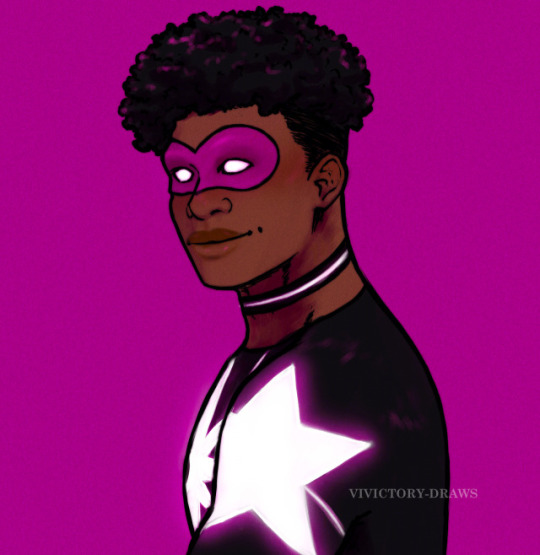
Next we have two pieces from my favorite Evil Woman Apologist, @vivictory-draws, one of a divorced Barbara and Kara being totally normal about it, and the other of my child and blorbo that haunts my waking hours, Conrad. Love N to death, which is why I haunt her with threats of commissioning Joker/Desaad Yaoi.
...Maybe for the next list, who knows...
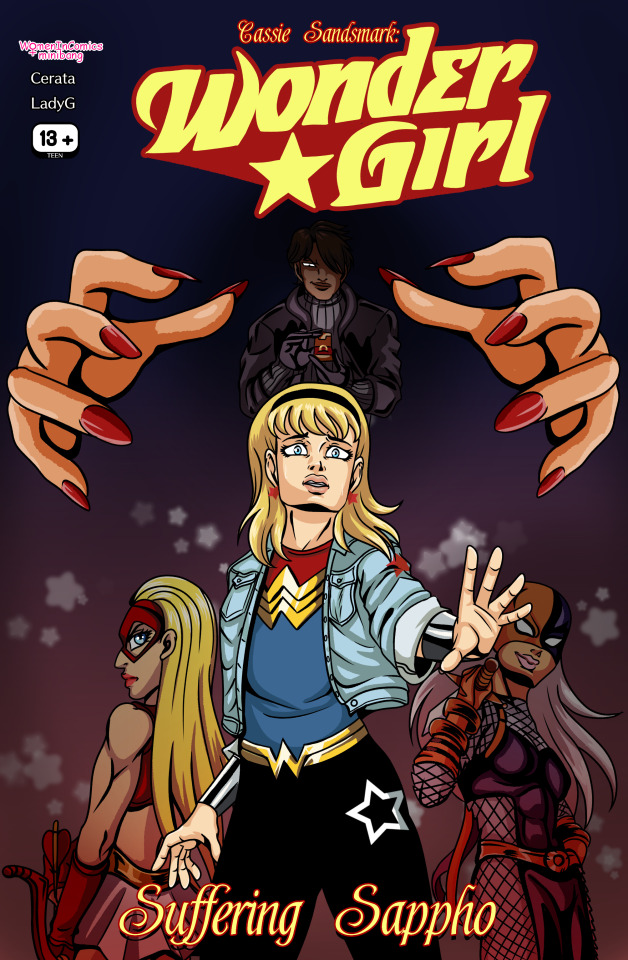
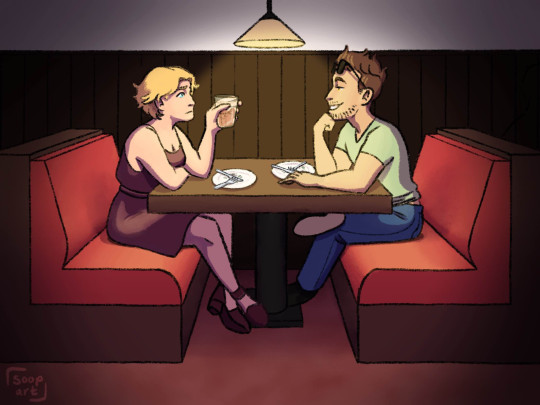
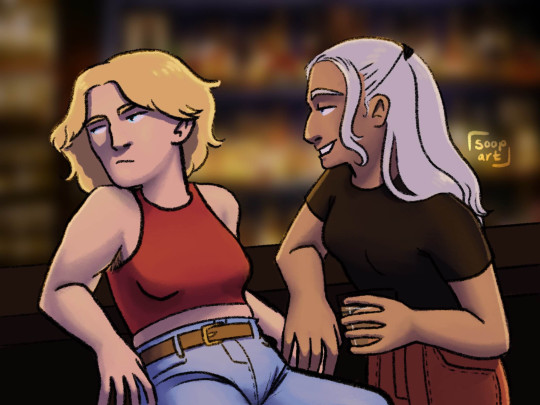
So next we have the art created for the last @womenincomicsminibang (which is going to be returning with a reverse bang in a few months, keep an eye out on that.)
The lovely and evocative cover was done by the talented @breakingthespacetimewall, and the scenes of Cassie trying and failing to get her life together were done by the wonderful @soop-jpg
Working with them was a pleasure and honor, and their dedication and kindness really helped me through finishing that fic, and I remain incredibly grateful for that.
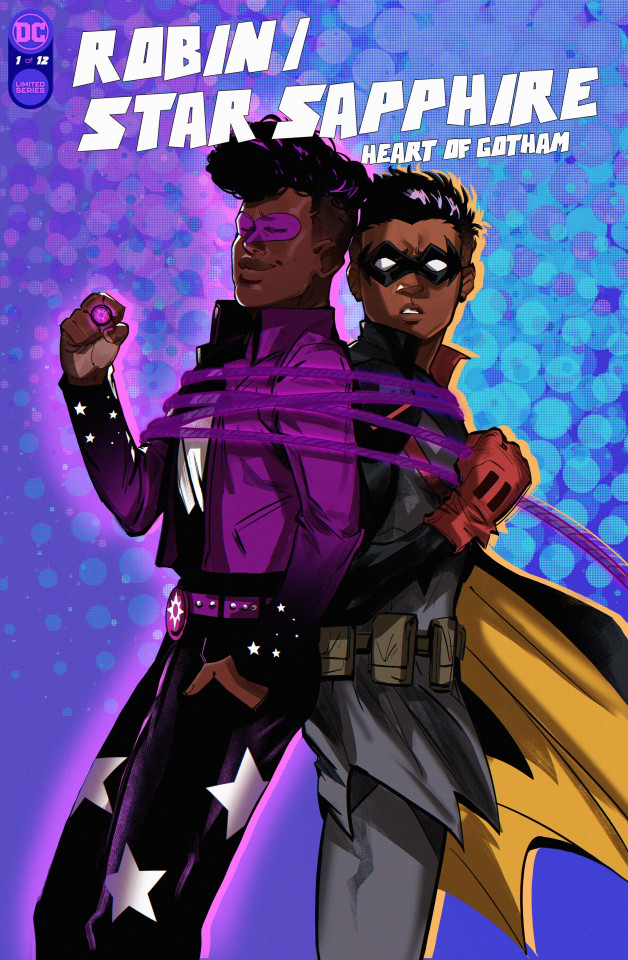

The first person I worked with this last year, and the one who really helped solidify the core of a lot of my projects, @nicodrawings drew a glorious cover for my mania-induced first longfic, and also a character reference for the aformentioned disordered young man who haunts my waking hours. She's a professional through-and-through, with wonderful instincts and great communication. She's also working on a fan-comic project of her own that I think is wonderful and am excited to see continue.
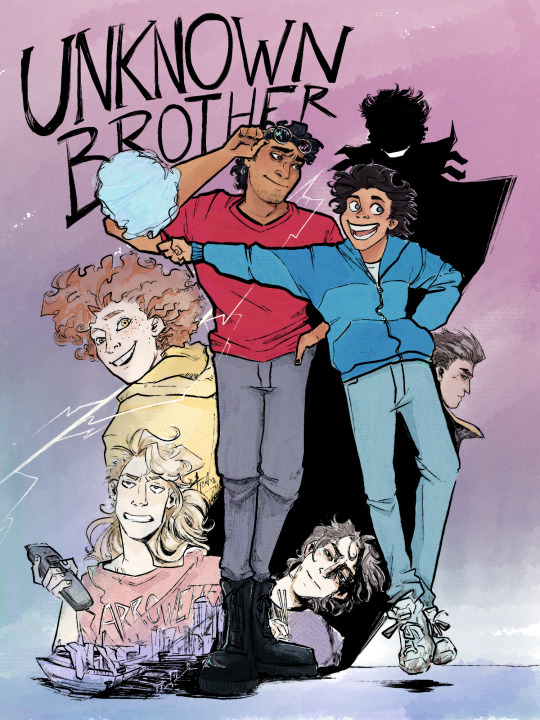
I lucked out and was paired with the super chill, super talented @byeara on my first fan project ever, and they hooked me up with this super fun and detailed cover for the fic I wrote for that one kon-centric minibang. I loved working with them, and would love to do so again, logistics willing.

This jerk @vnekey made me cry by drawing really sweet, totally unexpected fanart for that mania-fic I wrote. I'm still a little speechless really, I'd never gotten fanart of any sort for any reason before, and to receive something so lovely as the first thing really touched me deeply, and honestly kept me writing through some rough patches.
...Fight me!
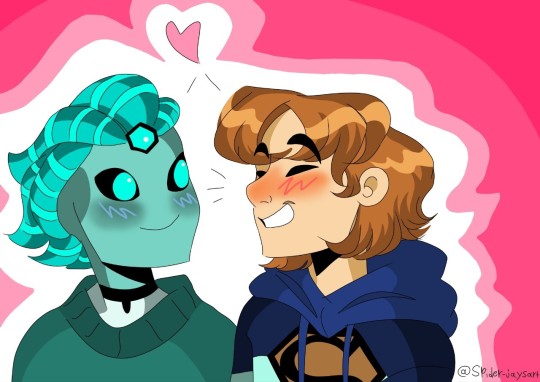
My first ever art trade! Kind of! @spider-jaysart is super sweet and supportive and made my...second biblically (is there a Source bible? Are there religious Coluans?) cursed son and his hapless, frankly narratively cursed best buddy look so precious that they ALSO made me cry, can we stop that actually--

Speaking of my cursed son and his narratively cursed Kryptonian, @spicy-apple-pie created this really pretty piece that's...a number of weird deep cuts smushed together into something really specific, but neat if you have the context, which nobody does :3
She was so wonderful and patient and I really enjoyed seeing her run with her inspiration, the Kryptonian mural is super neat and not something I would have ever come up with on my own.
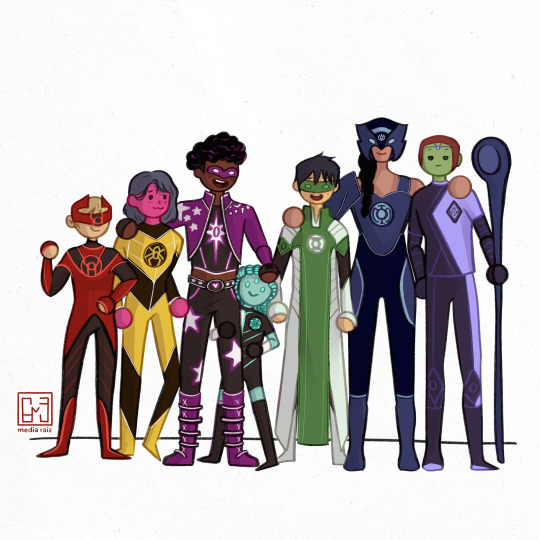
@mediaraiz Is really stylistically flexible, and their "Blob" style really scratched that itch I had for something cute and playful, and they were so game in taking on a larger project, and then went above and beyond in making my lanterns looks truly special.
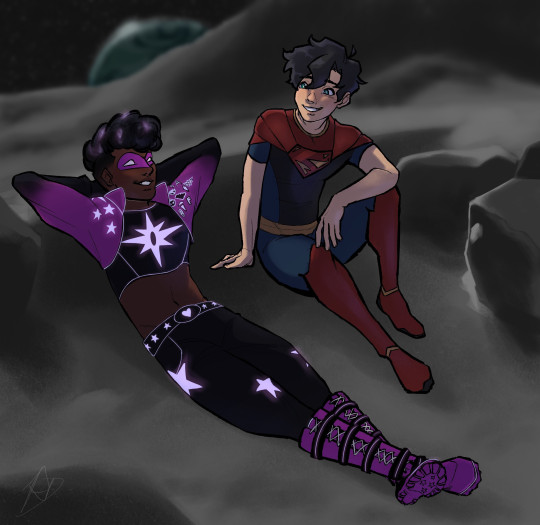
Finally (for now), @riverdeansart drew a sweet little scene of two horrifyingly stressed totally fine spacebros chilling and chatting about how everything is completely okay!
I was super vague about this one and Dean did a great job getting the vibes right anyway, and with haste.
...So yeah, that's if for now! I'll circle back in a bit when I'm forced to let more artists out of my basement everything else is done!
#shut up cerata#artists on tumblr#dc fanart#art commissions#art requests#kon el#jon kent#damian wayne#cassie sandsmark#chris kent#osul ra#otho ra#kara zor el#barbara gordon#cissie king jones#rose wilson#tai pham#sinson#lor zod#dc ocs#conrad bishop#brian bishop#emily andersen#Dyl Nox#Thyra Valkyr#image description in alt
38 notes
·
View notes
Text
Love in the Big City Part 2: Go Yeong and Umma
I was chased around, threatened, bullied and emotionally manipulated for months to write this piece, so @lurkingshan, this one's for you. *please release my family*

When I was reading the book, in Part 1, I remember being frustrated with Young as a narrator because of how standoffish he seemed with his descriptions of the people in his life (except Jaehee – Mi Ae in the show). I wanted to understand the emotional distance I felt in his words. And I got my answer in Part 2, where the relationship with his Umma was laid bare for us to see. The structure of this section was so smart, for it established the roots of his behavior in his childhood with Umma, and linked it to how it shaped the relationship he currently had with Hyung. Seeing it come to life on screen in the episodes this week was a treat to watch.
It becomes evident that Go Yeong’s relationship with his Umma is complicated as soon as we see them interact on screen. She is steadfastly religious, someone who believes that miracles can cure things that humans sometimes deem incurable, like cancer. We could easily infer from what we’ve seen of Go Yeong so far that she would not approve of his life.
Before I get into how her opinions and actions affect and influence Go Yeong, I wanna fully break down some of the objective facts we know about her:
She divorced her husband after he stepped out of their marriage and didn’t even have the courage to tell her about his infidelity
She is a single mother
She is an entrepreneur (in fact, we see her working from her bed in the hospital in multiple scenes)
She is religious and believes in the power of God
She is proud of her son
She loves her son
The last two points come with the biggest asterisks, because if she loves and feels pride for her son, how could she make him feel so alone? And now I shall try to explore this woman’s psyche to the best of my abilities, with a little bit of help from my personal experiences and therapy sessions I’ve paid money for over the years.
When we try to picture a homophobic parent, the image that our brain usually conjures up is often one-dimensional. (Note: This is NOT AN EXCUSE. I’m not trying to justify her actions. I am simply trying to understand why she did the things she did, by placing the context of the events of her life around them.) It is easier to process our emotions re: bad parents who hurt their children when we view their actions as simple. “They could’ve chosen not to do it and yet they did, so I hate them” is the conclusion that is the easiest to arrive at. That doesn’t make it untrue, but oftentimes, it is not the whole truth. Life is rarely, if ever, that simple, and our parents can truly love us while also rejecting fundamental parts of who we are, and never reconcile the two.
We see in the show the circumstances under which Yeom Eun Suk (Umma) finds out about her husband’s affair. She and little Go Yeong observe him from the sidelines, hidden, and see him smile like he had never done in all the time he had spent with them. We see Eun Suk feeling crushed by the implication that whatever love and happiness she thought she had had in her life with her husband was all potentially a farce. The fact that she chose to separate from him implies a couple of things: 1. She had strength and resourcefulness to provide for her son as a single mother in a restrictive patriarchal society like South Korea, and 2. She understood that staying in the unhappy marriage would only make her bitter and would affect her son more negatively than him growing up with a single parent.

She was brave enough to make those choices, and yet was still bound by her sense of propriety molded by society, and her faith. I’ve had a dynamic relationship with faith throughout my life, but I understood pretty quickly that questioning one’s faith is a particularly painful experience. Faith is supposed to be the solace one could turn to during trying times. When one is forced by circumstance to question their faith, it leaves them unmoored on the inside and further isolated on the outside. Eun Suk was already isolated to a certain degree by her divorce and her single motherhood. From what we learned in the book, there’s a history of cancer diagnoses in her family, so I would posit that she had been in Go Yeong’s shoes before, caring for her terminally ill parents in the past. Which is additional trauma from caregiving in her young adulthood that would’ve shaped her life. So I understand Eun Suk not questioning her faith when it was shaken.
She rebuilt her life and community by pursuing her faith—attending church, making friends who shared those values, and idolizing the Christian heteronormative lifestyle even after it failed her. She followed the rules dictated by her faith and community with utmost devotion, including building an entire business around heteronormative romance, in part because she had already transgressed by breaking up her own family and needed to prove she was not bucking that ideal or rejecting the church’s teachings with her choices. We see her take care of her appearance over and over when she is in the hospital after her first diagnosis and surgery, and it is yet another sign of her conformity and dedication to presenting a certain picture of her life. I understand why she would see her teenage son kissing a boy as a blemish on “a life deemed beautiful by God” and panic. I understand why she would think a psychiatric facility would help her son, and that it was her duty to try. (Note: once again, I am not justifying her actions, I am trying to understand them. Conversion therapy is deplorable and my heart goes out to everyone who has been subjected to it, including Go Yeong.) Eun Suk’s faith saved her by giving her purpose and community after her husband’s betrayal, but it also told her that her son, in his queerness, is fundamentally flawed. And like most people in this world, she chose not to rethink her entire life, and instead chose to believe that it is her duty to save her son from homosexuality and guide him to righteousness via the same path that saved her own life, ultimately traumatizing him. Hello, intergenerational trauma, my old friend!
@lurkingshan has already discussed the kdrama-fication of Part 2, with the increased intensity of Go Yeong’s romance with Hyung/Yeong Su. Expanding on that, I think the show’s depiction of Go Yeong’s relationship with his Umma rounded out the sharp edges of Young’s cynical tone from the book. We see her enjoy spending time with him. We see her joke around with him. We see her read her child with uncanny precision that mothers seem to have when she asked him ��Why are you sulking like a child?”, when he was, in fact, sulking like a child. We see her observe and deduce that her son is probably seeing someone, and that someone is likely a man. Which then leads to her asking “Must I meet them?” when Go Yeong suggests a meeting with Yeong Su in the park. She runs from direct confrontation of her son’s sexuality, and yet diligently copies Bible verses, hoping for a miracle.
Eun Suk sees her son’s queerness as her own failure, and Go Yeong, in turn, sees his righteous anger towards his Umma, as his. She is so proud of him that she saves newspaper clippings of his achievements, but she is also ashamed that she couldn’t “save” him. She loves him within the confines of her faith. It’s not enough for Go Yeong, but it’s the best she can do; their relationship remains at an impossible impasse.
Yeong Su’s presence in this section is interesting because in addition to his primary role of serving as the broody, tortured creative who swept Go Yeong up in a whirlwind romance, he also serves as a parallel to Umma’s traits. When Yeong Su exclaims that “someone like [Go Yeong] couldn’t even imagine [his struggles]”, it rang eerily close to Umma telling her son “Don’t try too hard. Everyone must go sometimes”. The expression of disdain is the same, but in Yeong Su it reads hollow, as a pretentious assumption, while with Umma it registers as tired disappointment that Go Yeong would’ve surely felt as heavy as a boulder.

After finishing the book, I found myself going back to a particular paragraph:
...[I] was old enough to know that my mother did not exist solely to hinder my existence but was a person in her own right who had fought hard making her way through life. She just happened to be unlucky. In other words, the fact that our relationship had been so terrible was as natural as cancer or fungus or the rotation of our planet or sunspots. I knew this, but the feeling that she was the source of all my problems kept nagging at me. I kicked myself for thinking this about a dying person, someone who was only skin and bones at this point, but the thought refused to leave my mind.
It took me a long time to reach the acceptance Sang Young Park has put in words here. The fact that my trauma is an unfortunate byproduct of the life my parents had lived, and was not premeditated or fuelled by hate, was a hard and unfair pill to swallow. I want to grab Go Yeong and tell him that it is okay if he can’t ever forgive his Umma. Time will wash over his hurt and let him love her, even without the apology he deserves from his Umma. And I hope that, one day, he can learn to love the people in his life differently than the love he received from his mother.
53 notes
·
View notes
Text
A Different Worldview and a Different History; Catholicism and Orthodoxy
The Roman Catholic Scholastic thinker Thomas Aquinas (1225-1274) wrote in his massive work, the Summa Theologiae, that theology is the "highest scientia" since a high degree of rationality is required to understand the most important and complex philosophical concepts about God. The universities that developed during the Scholastic period in the Christian West were intended to teach students how to deal in this "science" of theology through rigorous conceptual analysis. Theology was considered to be the preeminent Scholastic endeavor, a good thing in many ways. Yet, as a result of the high regard for logic and rationality in medieval Roman Catholicism, those who studied and taught (the "doctors") came to be more highly regarded than the monks and nuns (the "religious") whose main vocation was to pray.
Theology began to be expounded by scholars outside of the context of prayer, pastoral ministry, and liturgical worship. Pelikan traces this specific change in the West through the changing job description of the theologian. He notes that, between AD 100 and 600, most theologians were bishops; from 600 to 1500 in the West they were monks. But after 1500, Western theologians are university professors: "Gregory I, who died in 604, was a bishop who had been a monk; Martin Luther, who died in 1546, was a monk who became a university professor. Each of these lifestyles has left its mark on the job description of a theologian." After the sixteenth century in the West, the task of theology increasingly became separated from its earlier moorings to the worship of the community and the spiritual disciplines.
From an Eastern Orthodox point of view, knowledge of God comes only from an encounter with the God who has revealed Himself: "What may be known of God is manifest in them, for God has shown it to them" (Rom. 1:19). Thus, theology can never be separated from prayer, worship, and contemplation of the Holy Trinity. Metropolitan Ware affirms that all true Orthodox theology is mystical: "Just as mysticism divorced from theology becomes subjective and heretical, so theology, when it is not mystical, degenerates into an arid scholasticism, 'academic' in the bad sense of the word." That is to say, Orthodox mystical theology guards against either unacceptable extreme: subjective and heretical, or arid and academic.
- A Basic Guide to Eastern Orthodox Theology, Eve Tibbs
#orthodox christianity#roman catholicism#so many asks about the differences between catholicism and orthodoxy#for my non-Orthodox friends#i love you guys but yeah i don’t mean to be offensive when i make these posts#it’s history and Orthodox ecclesiology#christian mysticism#mysticism#theology#empirical theologians#rationalism#humanism#tradition#St. Gregory Palamas#thomas aquinas#hesychasm
20 notes
·
View notes
Text
Hello folks! I hope that all have you had an opportunity to Mass or later today since it is the start of the New Church year. This corresponds for me reading the Bible in a Church year. I believe every Christian should read the Bible all the way through in his or her lifetime. This sounds a little intimidating because in a sense it is. The Bible is a 2 volume Library with many books, different styles of literature, from a time long long ago, in different languages. In our modern age we are so radically divorced from that time with a way different pace of life and thought processes.
Yet the Bible is more accessible to us than ever. I have the Bible on my phone, I can either listen or read it. Furthermore, unlike the past, literacy is normal. A 2nd century peasant from the Roman or Persian would do a lot to have a k-8 education these days. Furthermore, as we uncover more about the past, we learn more and more about the languages used to write the Bible and the context where, how, and why it was written. Finally Jesus Christ has the Church which He established to help us to understand Holy Scriptures.
While it is so important to pray, participate in the Sacrments and learn about the saints and His Church, we cannot forget to make Scriptures part of our day to day. Ignorance of Scriptures is ignorance of God.
If you don't feel called to read the Bible in a year yet (listen to the Holy Spirit), that's ok. Work up to that. You can do that by doing daily focused readings. The daily Gospel readings is an excellent places to start or smaller books that have a more self contained narrative like Ruth, Daniel, or Esther.
Here are a few tips for reading the Bible in a year. :)
-Read at your own pace with your needs in mind. If you read the Catholic Canon of the Bible that is 3.5 chapters a day on average. With my adhd and not so simple life at this time I usually read 5 a day, knowing I'll have off days where I'll read 1 or 2, and because some books like Jeremiah are more dense that also contributes.
-Stay committed: it maybe tedious at times but if you stay on top of it, reading the Bible will be alot more enjoyable. You'll feel less pressure since you aren't catching up. Furthermore think about the benefits of staying committed. God does the work but he works through human action.
Don't worry about catching every detail and enjoy what you do find: The purpose of reading the Bible through the year isn't a scavenger hunt. It's about looking at the forest for the greater detail. With that said when you find details that are new stop and think about how things relate together in the grand design. Look for recurring phrases or themes and images and think about where and when you saw them. Finally while religious text (that dives into mysteries beyond us), it is a story so don't be afraid to find things funny or sad like in any other book.
Use your resources: If you come across something you don't get even after you think about and try to piece things together, first ask someone you know that you think you can help you. If not then look it up. Odds are some Saint from hundreds of years ago had this exact question, and he figured it out with his buddies and wrote material down you can find today. Or maybe a very helpful animated video.
I hope this helps, take care!
#christianity#catholic#catholiscism#jesus christ#holy spirit#jesus#roman catholic#bible scripture#bible
15 notes
·
View notes
Note
Hihihi! I wasn't sure who to come to for this info, and I couldn't find anything related to this, so if you don't have an answer/insufficient research or something like that, then feel free to ignore this! /gen/neu
What's the difference between a tulpamancy and imagimancy? Ty if you answer this ask! <333
No problem! Full disclosure: I have done more research into the Buddhist origins of tulpamancy, but I'm not Buddhist or a tulpamancer, so if I get any academic or cultural information wrong, I apologize.
So, tulpamancy has an origin in Buddhist spirituality, and the modern western "tulpamancy" you see on tumblr is a misappropriated version of it.
In Tibetan Buddhism, tulpamancy is the act of creating a thoughtform (tulpa) with the goal for it to become an autonomous person through developing independent thought, emotions, etc. These thoughtforms are also called "emanations" or "emanation bodies" depending on the Buddhist you're talking to. Most tulpas also break away from their creators once they reach autonomy, therefore completing a cycle or the exercise. I know it's originally supposed to be an exercise to teach the Buddhist student *something* about nirvana and being a living human, but I can't remember or figure out what the specific goal is, so I apologize if any part of this explanation is 'off.' I'm not Buddhist, so I encourage you to take my answer as a starting-off point to do your own research into the topic.
Here's a reddit post by a Tibetan Buddhist on tulpamancy, and here's another reddit thread with multiple insights on the purpose of tulpas.
Appropriated tulpamancy like you see on tumblr, where the tulpamancer is making more than one thoughtform, isn't working towards the goal of autonomy, or is utilizing manifestation techniques to create headmates or "friends" is not tulpamancy. It's thoughtformism--it's a completely different practice that is just using terminology from a different (religious and culturally charged) practice. It should not be practiced under the guise of tulpamancy. It's not cultural appropriation because you're white, (anyone can convert to Buddhism); it's cultural appropriation because you're using terms and ideas in a way completely divorced from the original (cultural, religious) context.
(This cultural shift didn't start on tumblr, by the way. Occultists and westerners were recontextualizing and appropriating tulpas long before people on tumblr did it.)
After a lot of POC and Buddhists criticized the tulpa community, a few secular thoughtformist communities have come up. Daemonism is one example, where the "lore" and framework around your thoughtform is based on the novel His Dark Materials by Philip Pullman. (Although, what I've seen in the community is that daemians can play pretty fast and loose with the rules and no one really minds it.) But a lot of thoughtformists I've seen on tumblr just seem to make a certain flavor of dude (like a servitor, egregore, godhead--all things I'm not yet familiar enough with to explain) without tulpamancy OR daemonism as a label (which is a good thing!).
Imagimancy is the latest thoughtformist community to come up, and in my perspective, it feels like a "configurable" experience in thoughtformism. There's no more religious or cultural context, there's no more lore from already-existing books or movies, there aren't even any occulty or mystical labels if you don't want there to be. It's just... imaginary friends, but taken seriously and refined into a practice or activity that "older kids" and adults can do in a fulfilling way. To me, imagimancy IS the closest thing to what appropriated "tulpamancers" wanted tulpamancy to be. There are no rules or restrictions. One of the co-coiners of the imagimancy term describes imagimancy as "not trying to reinvent or relabel things; just filling the gaps between [thoughtformist] communities," and I think that's the best explanation out there tbh.
This isn't a "tulpas dni" post or anything like that; I'm interested in everyone's experiences of thoughtformism, even if someone's vocabulary isn't the most culturally sensitive. But I am very much in the ballpark of "what you're doing isn't tulpamancy. Call it something else" as a person tbh.
#also this ask felt 90% like bait to get me to voice my stance on tulpas but if it wasn't i apologize lmao#imagimancy#thoughtforms#tulpamancy#ask#also sorry for the long ass explaination. thoughtforms are my special interest. what can i say?#long post
24 notes
·
View notes
Note
hii Yokan! i miss you!😭
how are you? how is work?? I hope everything is going well<3
rn there's a little Comic Con in my city, and it really did help my mood!! (even tho I throwed up 6 times and fainted during the morning of the first day due to the heat and lack of iron🥲) 2 days down, 2 more to go 🙏
ANYWAYS! I know you've been going through a writer's block lately, and I read a post that said something about asking/commenting about the fictions to help the "stucked" autor, SO!
I've been re-reading TW III (shocking, I know) and those little hints about married!kc are just 😭😭 my heart melts, really, although... I was never really sure you'd get them married, mostly due to Care's speech to Cami about how Klaus supposedly sees weddings, and because I remember you saying that you weren't planning on giving them an actual marriage, but rather the closest thing next to it. I checked to comments to see other thoughts, and I saw one of you reply saying that you were completely against married!kc at the start, but then you were slowing changing your mind about it...
so, what was it that made you say "fuck it, I'm gonna ring the bells"?? is it because many people asked you to do it, so you are throwing us a bone, or is it something else?? I'm really interest on hearing the process of your change of heart <3
have a good one, friend <3 love you xoxo
I don't know if I am eloquent enough or if my train of thought makes much sense, but I will try 😂
Also grab a chair because this will be a long one. Be careful what you ask me, I do not know how to shut the fuck up 🙃
Objectively, I still think Klaus is not the marrying kind (in canon context, at least). That man has been alive for a thousand years. He's the vampire of vampires, one who sees humans as a lower species. He's used to getting what he wants by conquering and subjugating because he can. Why would he ever submit himself to an inherently human institution that, throughout history, has served as a tool for various types of social, political and religious control? The ceremony itself doesn't mean anything to him. He probably thinks it's ridiculous and performative, not to mention extremely frail. You can just change your mind and get a divorce, or the good old spouse murder, and then what? What's even the point?
(Just to be clear: I'm not personally preaching against weddings and marriages here btw, it's just how I think Klaus might have seen it.)
If you look at it from the sentimental side, Klaus spent almost a thousand years saying that love is a sign of weakness, a character flaw. He carried his siblings, the only people he genuinely cared about, inside coffins because he didn't trust them enough not to leave him, betray him or end up captured and killed by one of his enemies. Now, why would he want to marry someone, thus exposing yet another vulnerability to be exploited?
Having said that 😂
When we first see Klaus in TVD he's trying to surround himself with a whole new OP supernatural species that will have no choice but to stand with him. They will protect him, they will go to war for him, do whatever he asks them to and they will never leave (or that's what he thought, anyway) because they don't have a choice. That is the only way Klaus knows how to trust people: by completely removing their capacity to challenge him. That's how paranoid he is.
But as the story progresses, and especially with The Wolf in particular because it takes their relationship much further than the show, Klaus realizes there is more than one way to earn people's trust. I feel like that's one of the pillars of his relationship with Caroline. He could've just compelled her (in TVD, not TW because she's a witch), but he never did because he wanted more from her than obedience. All of the things he liked about her - her personality, her honesty, her fire, her loyalty - would've been essentially erased or made meaningless if he'd compelled her. Which puts her in direct opposition to how he related to his hybrids, right? He pretends to be fine with people who have no choice but to follow him, but what he really craves is more real than that. He surrounds himself with people who will worship the ground he walks on after some forged "gratitude" for releasing them of their curse, but he is fascinated by how gutsy Caroline is to look him in the eye and tell him the things that no one else will dare to. What he really seeks but doesn't have the courage to admit is that he wants someone who will choose to be with him. And that's the difficult part, because it can't be conquered or taken, it has to be earned.
Klaus comes from a place of paranoia and extreme distrust of everything and everyone around him, especially after Mikael in New Orleans, and he feels very isolated and alone. He tells Stefan about that, right? The loneliness of immortality. When The Wolf starts, in spite of how he and Caroline were having a bit of a thing before it, he's not sure she would want to stay with him. Actually, he thinks the first chance she gets, she's gonna bail. It's why he's mad when he thinks she wants to terminate the pregnancy. It's not about the baby (it's never about the baby), he couldn't care less about the damn baby at that point, it's the fact that he thinks she's trying to get rid of him, as if that pregnancy is the one thing that is holding them together at that point and so if she's no longer pregnant, she doesn't have to be with him. What I'm very inarticulately trying to say is that his initial approach to Caroline being pregnant is the same he had with his hybrids, as if the baby is a version of a sire bond. It's crazy and dysfunctional, yes, but it's how Klaus rationalizes it, how he thinks he gets to keep people around him - either through daggering them or giving them no choice.
Slowly, Klaus internalizes the fact that Caroline is choosing him. She tells him that a few times throughout the story, and even when he's hallucinating her at the beginning of TW4, because that's something that she has said before and that has stuck with him for reason. She could've left him at any point, but she didn't because she wants to be with him. It's a choice that she has made not because he forced her to, but because she's in love with him. She protects him, she fights for him, she walks through hellfire for him because she wants to, not because she must. He has earned her trust and her love and her loyalty. And that is something that is new for Klaus in his one thousand years of life, at least at this magnitude and with this much clarity and certitude.
So I think when I started writing TW3, which was them in their domestic era, it started to feel like something Klaus might actually do. Not just because it obviously does mean something to Caroline and he would basically do anything for her (even though she never asks for it, which in itself is something, because Caroline comes from relationships that made her feel so insecure and unsafe that she would've held on to a ring like a lifeline, but with Klaus she simply does not need hard evidence to feel safe and reassured, she knows how Klaus feels about her, she's very comfortable in their relationship, she knows that what offers her means a lot more than a thousand weddings to other people ever would - even though she does still love a good wedding lol), but because it suddenly makes sense to him. Not the big party, or the tradition of it, or making it official or anything of the sort, but as a way to externalize what he feels. There is a symbolism to it that while not ideal, it might be the closest to thing to expressing just how devoted he is to her and how she is, pure and simple, eternity for him. When that comes from someone who has lived for as long he has, and who has been as cynical as he was for as long as he was, it does mean something, even if nothing else does.
There is a territorial factor to it as well, of course. 😌 He's a very possessive man and so he wants everyone to know Caroline is his, and it's why it first came to him during the thing with Jackson, but it's more than just that. If it was just about that, he wouldn't do it. He is at a point where he no longer has any doubts about how Caroline feels for him (although there will be a little something something on that front at the beginning of TW4, just because they've been apart for so long, but it will be quickly dispelled).
The most sacred thing for Klaus was the vow he took with his siblings when they fled Viking Falls. They stuck together through everything because of that. He knows the value of a vow and a promise. And he wants a version of that with Caroline. It's the first time in his life when he contemplates genuinely offering that to someone other than his family. There are a million ways he could go about it, probably, but he knows asking her to marry him is the one that will be most representative to her, because of the age where she was born and how she grew up, etc.
And so that is why I decided that Klaus was going to buy a ring even though I crossed my heart and hoped to die a million times for years when people asked me about that. 😂 I just think it's the natural course this story has taken. It's long enough that it eventually made sense to me that he might do it.
Does any of that make sense???? I don't know! I just typed my stream of thought and hoped for the best and now I'm afraid to read it again, so apologies if it's just crazy words.
Now if only I can get back to writing and actually get to that part. 🥲 Pray for me 🙏
THANKS FOR COMING TO MY TED TALK! 🙃 Here have a pretty married Klaroline gif.

#yokan answers#rosedforbes#BE CAREFUL WHAT YOU ASK ME#klaroline#the wolf universe#if only i could actually write SIGH
30 notes
·
View notes
Note
I’m not Anon, but I’m definitely ready for the longest soapbox answer…
Okay well I fear you'll be disappointed because the longest answer has very little to do with Emmrich and goes thusly:
Nevarra is essentially fantasy Germany/Austria/Scandinavia. Fewer than 10% of men in those countries, overall, are circumsized. This alone is probably reason enough to say he's uncut in any modern context. In the year 20:25 Millenium (Or whatever your version of the 21st century in Thedas is named) it's possible that the Fereldans and maybe Orlesians have picked up the practice, but I don't think it would be popular in Nevarra, or most of the North if I'm honest. Certain enclaves in Tevinter maybe.
Within the context of game-time Thedas, you'd be hard pressed to convince me that ANYBODY is cut save for POSSIBLY Qunari? Because we don't know enough about their beliefs imo. If the Chantry was marching around demanding rote circumcision I think it probably would have come up at least once, even in a game as relatively desexualized as Dragon Age (desexualized as in: you never actually SEE a penis, cut or otherwise, in these games.) Until (relatively) modern times IRL, circumcision was a religious practice almost exclusively.
Comparing Thedas to the IRL medieval ages isn't as apt of a comparison for Veilguard as it may have been for previous games, but this is a belief I still hold. You could make an argument for circumscion being divorced from all religious contexts in Thedas, and instead being a hygienic/aesthetic choice, and I don't necessarily have an argument against that. It's just not a view I hold. Primarily because, point THREE:
As far as circumcision goes, I don't care for it. Totally understand that it's a religious/cultural practice for a very large portion of the world's population, and that it does have certain prophylactic applications. The practice of circumcision is EXTREMELY controversial and I don't really want to open that can of worms, so I'll just say that I completely respect it as a choice that people make for themselves and their children to honor their cultures. If we're talking about me? Just ME, personally? The beliefs that I specifically hold, with the understanding that nobody is obligated to share those beliefs? If anybody tried to take my kid away from me seconds after birth to do LITERALLY ANYTHING to their genitals I would scream and scream and scream until they did something to make me stop i.e. give my baby back. I have warned my family about this. Intersex children are born every day and are often mutilated by 'well-meaning' doctors under the guise of circumcision. This happens with distressing frequency, and it's very possible that you won't know about it unless you ask the right questions or know exactly how to read your child's medical documents, IF you have access to them.
Under no circumstances am I campaigning for the abolition of circumcision as a practice. I just feel like it's something that should be better educated about, especially to expectant families. The vast majority of people just kind of say, "Well, my doctor/husband/dad says I should have my child circumcized, so I guess I will," and it doesn't HAVE to be that way.
Anyway yeah! This was very outside of my normal bullshit and I sincerely hope I didn't ruffle any feathers--the original anon stumbled onto something I'm passionate about and got me ranting, for which I apologize. We will return shortly to your regularly programmed Old Man nonsense 😅
18 notes
·
View notes
Text
i understand why the 'jesus was a radical socialist who hung out with women, preached wealth redistribution, and fought religious authorities' is a popular trope, especially as a response to the insane conservatism of american christianity, and i don't think factually it's wrong. but i have a few reservations abt the way it gets thrown around
main one is that it tends to become a thought-terminating cliche. if 'jesus was a socialist' is meant to be a clickbait summary of who Jesus was that encourages people to go back to the gospels and read with fresh eyes untinged by right-wing stupidity, great.
But I feel like it often gets used as a substitute for the text - and so rather than, say, going back to actually radical things Jesus said, people appeal to the popular construct of radical socialist feminist Jesus in a very vibes-based way. Jesus becomes defined as 'guy who shares all my exact political beliefs and can be invoked against hypocritical Christians'.
and i think that then means people don't seriously think about stuff he says that might actually be controversial. Is Jesus' hard-line anti-divorce stance harmful? Is 'turn the other cheek' endorsing silently submitting to abuse? Is his claim that looking on a woman with lust is just the same as adultery purity culture? Is 'carry your cross' romanticising suffering? Is the way the Gospel authors frame the Pharisees as corrupt religious authorities actually anti-Semitic and historically unfair? Is his relative silence about Roman colonisation problematic?
Obviously, these texts have historical context and are open to interpretation etc (as are the Old Testament and Paul, which get the opposite extreme from Jesus of being flanderised into consistently nasty). But I think the ideal socialist Jesus figure de-historicises him in a distorting way (for example, projecting anti-capitalism on someone who existed before capitalism did).
And lest it seem like I'm picking on Socialist Jesus, I think this is true of all the soundbite Jesuses. Meek and mild storybook Jesus, conservative 'love the sinner hate the sin' Jesus, unrecognisably mangled American Jesus, generic spiritual Jesus erased of his Jewish heritage. Some of these are outright wrong (American Jesus), some of these are entirely true but incomplete (storybook Jesus, who, in fairness, is aimed at literal children); I would say Socialist Jesus is by far one of the best.
But I think it's still a very static, flanderised way to understand someone who is a real, living person, who calls people into a relationship with him. and so i understand it from general secular society; I don't have strong opinions on the Buddha and so i generally stick to 'he seemed like a decent guy with weird ideas', so I understand people not having deep-dive opinions on Jesus either. but i think for Christians especially, we do have a bit of an obligation to go beyond just reducing Jesus to soundbites, even when they are true.
34 notes
·
View notes
Note
Oooh that is so beautifully put yes yes I love it.
To be honest I think Valar should be pretty happy that Feanor is not devout; imagine his intensity channeled in honest and burning religious fundamentalism. It'd take him a week to start heretical mystery religion and Aule and Nienna would be informed there are whispers they are trying to usurp throne of Arda.
But also, one thing I have been fiddling with wip fics for while is, idea that Feanor is metaphysically, a divorce child of Melkor and Nienna. His fate is place where Melkor's shouts and her keening meet, the melding spot of his cacophony and her elegy, violence and grief within and upon and outside and enacted by. He is vessel through which their influence is unleashed upon Aman, his very birth proof that nowhere can be safe from Marring and grief.
(Within context of Ea-s-Most-Disastrous-And-Covered-Up-Divorce, this means both of them identify with Nerdanel. Nienna is obvious but really, Melkor gets it, when your partner is a stubborn psychological mess swallowed up by their own grief and so obsessed with their ideals and past that can't be fixed that they refuse to be happy and hear you out and just complicates your own and theirs life, poor woman you are so put upon, I have been there with two of them now!)
Ooh, whereas the idea I've been toying with is that Fëanor is solidly a natural...maybe not follower per se but student, agent in the world, of Melkor. He’s TRYING to be an agent not of Melkor-as-we-know-him but rather Melkor-as-he-could-have-been, but…
That Melkor's divine domain is change in a way that cuts through, recombines and builds on all the other Valar's spheres of power; that only because he is, personally, an asshole that this is become discord instead. That it is because Melkor is an asshole bent on evil that change is, in basic human psychology, scary; that difference is intimidating and easily hated; that the grief of what is lost so often supersedes the joy of what is gained, and we are forever looking back and bemoaning that we cannot make this country great again... That the end of Lord of the Rings, in which the Time of Elves is over and this is sad, a grave loss, but never a source of despair because it feels right in a way, as right as the stars fading as the sun rises, and now it is the Time of Men and this too is a good and natural thing, such that overall we feel joy...that this is a total triumph over Melkor-who-is, because it is how every now-terrible change should have been if only he hadn't been a total asshole.
And where does Fëanor fit into this? Fëanor inventor of alphabets, shaper of Light into stone in a way even the Valar didn't imagine, instigator by Oath and allegiance of the Flight of the Noldor and the Three Kinslayings and so many of the great deeds and tales of the First Age and beyond...who didn't live to see most of them? Fëanor is a catalyst in this ongoing tale, in this Great Music. He is flame himself, but mostly in that he is the spark that lights conflagrations.
That's notable not just because it's pivotal to the story of Arda, but because that's weird for an elf. Elves are constantly shown to value stability and timelessness. They wrap their lands in girdles of timeless peace. They pick a good king and keep him for millennia. They never start battles, only react when attacked - except the House of Fëanor and those closest to them.
...mostly in Kinslayings. Because this is Melkor's domain, and he is determined to make change a thing of discord, domination and destruction. But oh, how magnificently the Music might have gone if Fëanor's every word and deed, every moment of being, invited good rather than evil!
As it is, Nienna is always here ease the hurt as best she can. If only proud Fëanor would let her help...
#irleughlivelyatalanteangodfan#the silmarillion#eldar#valar#feanor#melkor#feanor and feanor's kin#analysis
81 notes
·
View notes
Note
Hi cupcake! Anti-Venom and 2, 4 and 12 for the ask game?
Hi honeybun! Sorry for the delay, I was busy horsing around! And thank you so much for the ask, I will try to not spontaneously combust while talking about my fave! And you did ask about my fave, so you brought this on yourself! Here we go!
2. Favourite canon thing about this character?
Before I start, I have to let you know, I am Indecisive(TM). As fuck. Which means I often don't have favourites simply because I cannot choose which one to pick. And also there are so many things about him that I love. Like his design. I love all the symbiotes but there is just something about his face and the way he looks that scratches my brain just right and makes me go apeshit. And that he is a wet pathetic dumbass extraordinaire, worse than when he is Venom even though he desperately tries to pretend like he's got his shit together. Like, they were always idiots but I swear Symby took half the braincells in the divorce, and when he got Anti they had to split what was left. And of course the whole religious nut messiah complex is funny as hell. Also little things like the way using his healing powers leaves him conked out, and the way he grows tiny spikes all over when he gets agitated or upset. God I love his little spikes. And also the way he embodies the whole "If I cannot be wanted, I will be needed, and if I cannot be needed I will be used until there is nothing left". Aughhh.
4. If you could put this character in any other media, be it a book, a movie, anything, what would you put them in?
I actually don’t do a lot of crossovers between different media, as I usually prefer putting my blorbos in situations in their own universe, or completely off the shits headcanons. But remember that story idea about symbiotes disguising themselves while in the spider verse? Yeah, I've stuck him in the spider verse a number of times for shits and giggles. Also because the multiverse means unlimited potential for settings and situations for them all to get roped into. Otherwise I do like putting him in medieval or fantasy settings, usually in multiverse context, because symbiote dragons babey!
12. What's a headcanon you have for this character?
Oh my. There are SO MANY HEADCANONS swirling around my noggin. (Like, I use canon for cherry picking, then take that and bits and pieces of fanon and anything I can find that I like and put it in a blender, then fill the gaps with whatever headcanons I feel like. Just frankensteining together several versions of him in my head that are between 30-80% headcanon, I keep them on rotation for whatever fits the mood.) One of my main headcanons is that Anti-Venom survives the spider island event. Simply because I don’t want him to die, and for fanfic plot reasons so that he and Agent Venom get more fun times together ;). I have a few different takes on how exactly the symbiote lives on, but it's kinda similar to how Carnage had bonded so closely with its host that it never really left, and could regenerate itself over time from the smallest traces in his body. Bonus points are that the biblical similarities of Anti-Venom sacrificing itself to save the souls of the innocent by giving up its body, only to rise from the dead some time later would absolutely send Eddie's messiah complex into overdrive and make him even more insufferable. Oh, right, and I should probably also mention that I frequently headcanon Anti-Venom as sentient/sapient. Because I want to, and because it makes things a lot more interesting. But I won't go into more detail about that here or else this will turn into a dissertation.
Hope you enjoyed my ramblings! I think I need to go lie down now...
9 notes
·
View notes
Text
Unmasking Honor Killings: A Socio-Legal Perspective
A few days ago, I sat in my dimly lit room , my heart racing as the story unfolded on the screen. Janhvi Kapoor and Ishaan Khatter portrayed star-crossed lovers, Parthavi and Madhukar, who dared to defy societal norms. Their love transcended caste boundaries, but it came at a steep price—the wrath of Parthavi’s family. As the scenes unfolded, I couldn’t tear my eyes away. The haunting music, the stolen glances, and the palpable tension—all of it echoed the pain of countless real-life couples.

How can love be a crime?
Why do families prioritize honor over their children’s happiness?
When will society break free from these shackles?
And then it hit me—I had to write about this. Not just as an academic exercise, but as a plea for change. The movie “Dhadak” became my catalyst, igniting a fire within me to expose the darkness of honor killings.
Introduction
Honor killings, a dark reality in many societies, continue to haunt us. These acts of violence are perpetrated against individuals—often women—who defy societal norms by marrying against their families’ wishes, having pre-marital relationships, or seeking divorce. In India, honor killings are particularly prevalent, impacting families, communities, and the fabric of our society.
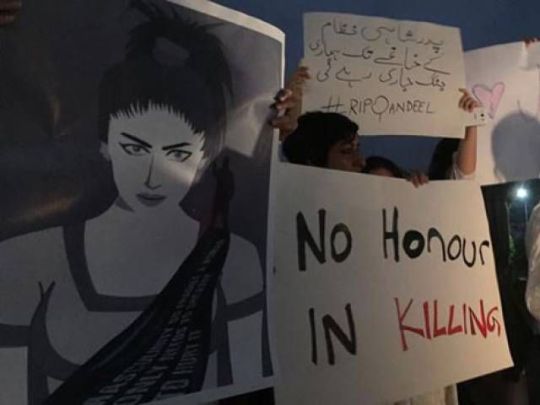
Understanding Honor Killings
Definition: Honor killings involve the murder of a family member, usually a woman, due to perceived dishonor or shame brought upon the family.
Triggers: Reasons for honor killings include inter-caste or inter-religious marriages, pre-marital relationships, and even allegations of adultery.
Gender Bias: While both men and women can be victims, women bear the brunt of this violence. The mere perception of dishonoring the family can lead to a brutal attack on their lives.
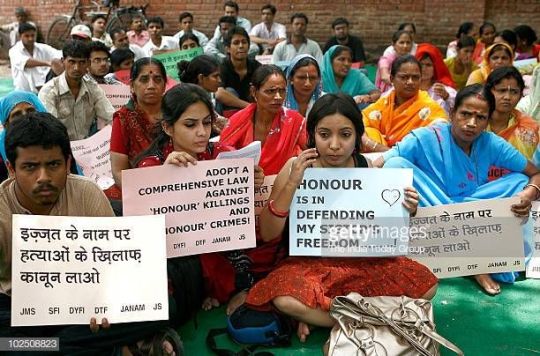
Socio-Legal Context
Morality: Indian society adheres to a caste-based stratification system, where caste and gender identity at birth determine one’s status. Transgressing these boundaries disrupts the social order.
Article 21: The Constitution of India guarantees the right to life and personal liberty. Honor killings directly violate this fundamental right.
Legal Framework: Although there’s no specific law addressing honor killings, existing provisions under the Indian Penal Code (IPC) can be invoked to prosecute offenders.
Case Studies
Rajkumar and Deepa: A Dalit-Thakur couple faced brutal violence after fleeing their hometown to marry. Deepa’s family couldn’t accept their love, leading to Rajkumar’s tragic death.
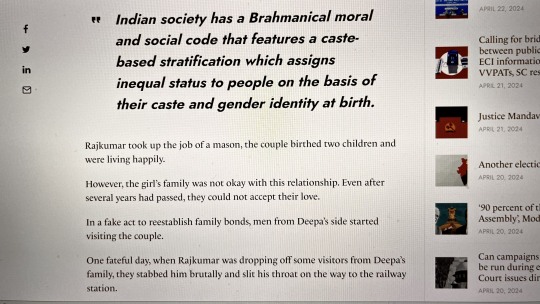
Kaushalya and Shankar: Despite opposition, this inter-caste couple married. However, they were attacked in broad daylight by Kaushalya’s family.
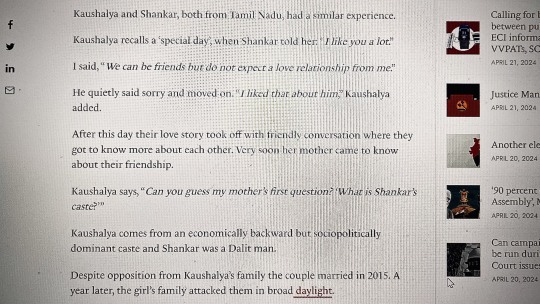
In the last 15 years, over 30000 men, women, and children have been killed in the name of "Honour"
Killing innocent love is not Honourable. It is an act of cowardice and a crime against humanity.
CONCLUSION
In the face of honor killings, our society must confront this issue head-on. It’s time to raise our voices, challenge entrenched norms, and pave the way for a more compassionate and just world—one where love is not a currency that costs lives.

8 notes
·
View notes